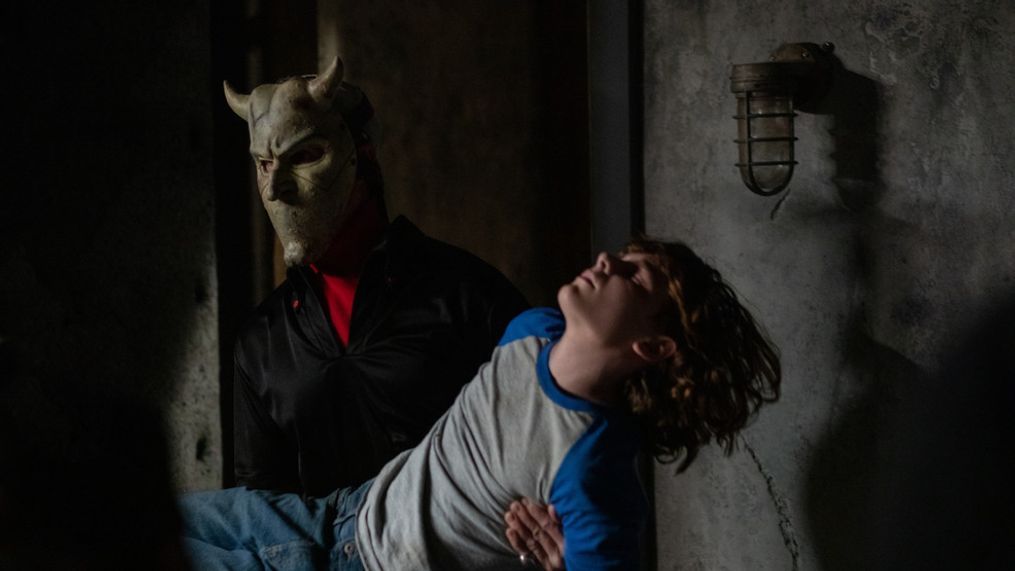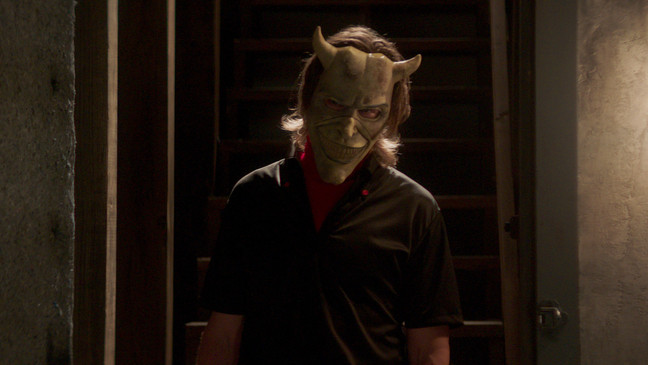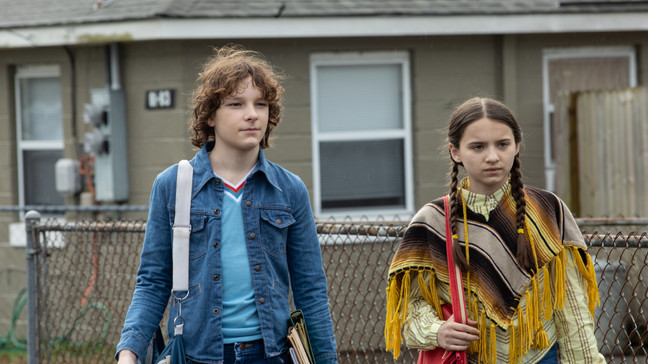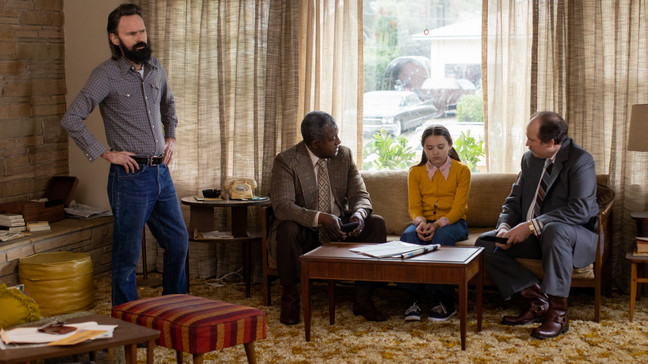Review: 'The Black Phone' is an effective coming-of-age supernatural horror
SALT LAKE CITY (KUTV) — The Black Phone
3.5 out of 5 Stars
Director: Scott Derrickson
Writers: Joe Hill, Scott Derrickson, C. Robert Cargill
Starring: Mason Thames, Madeline McGraw, Ethan Hawke
Genre: Horror, Drama
Rated: R for violence, bloody images, language and some drug use.
{sd-embed class="sd-embedded-media" data-alt="Scott%20Derrickson%20Full%20Splice%20720" data-caption="%7Bp%7D%7B/p%7DScott%20Derrickson%20and%20Ryan%20Painter%20talk%20about%20growing%20up%20with%20horror%20films%20and%20how%20personal%20experiences%20influenced%20his%20adaptation%20of%20Joe%20Hill's%20%22The%20Black%20Phone.%22%20(Video:%7B%7D" data-duration="289.7920000000002" data-externalid="76fbabbf7c274ac6b48b41bafdf36775" data-mediatype="video" data-renditions="" data-thumburl="/resources/media/c7406593-a902-4c99-8560-c7117cb30416-medium16x9_thumb_12612.png?1655934827487" data-title="Scott%20Derrickson%20Full%20Splice%20720" data-url="https://sinclair-vod-assets.sinclairstoryline.com/76fbabbf7c274ac6b48b41bafdf36775/hls/index.m3u8" data-defaultthumb="" data-embed-file="%3Cdiv%20class=%22sda-VideoEmbed%22%3E%0A%20%20%20%20%20%20%20%20%20%20%20%20%3Cdiv%20class=%22sda-video-media%22%3E%0A%20%20%20%20%20%20%20%20%20%20%20%20%3Ciframe%0A%20%20%20%20%20%20%20%20%20%20%20%20%20%20%20%20width=%22560%22%0A%20%20%20%20%20%20%20%20%20%20%20%20%20%20%20%20height=%22315%22%0A%20%20%20%20%20%20%20%20%20%20%20%20%20%20%20%20class=%22sda-embeded-player-iframe%20sda-VideoEmbed-iframe%22%0A%20%20%20%20%20%20%20%20%20%20%20%20%20%20%20%20src=%22/resources/embeds/vod.html?externalId=76fbabbf7c274ac6b48b41bafdf36775%22%0A%20%20%20%20%20%20%20%20%20%20%20%20%20%20%20%20frameborder=%22no%22%3E%0A%20%20%20%20%20%20%20%20%20%20%20%20%3C/iframe%3E%0A%20%20%20%20%20%20%20%20%20%20%20%20%0A%20%20%20%20%20%20%20%20%3C/div%3E%0A%20%20%20%20%20%20%20%20%20%20%20%20%3Cdiv%20class=%22sda-video-info%22%3E%0A%20%20%20%20%20%20%20%20%20%20%20%20%3Cimg%20class=%22sda-VideoEmbed-stopImage%22%20src=%22/resources/media/c7406593-a902-4c99-8560-c7117cb30416-medium16x9_thumb_12612.png?1655934827487%22/%3E%0A%20%20%20%20%20%20%20%20%20%20%20%20%3Cdiv%20class=%22sda-VideoEmbed-caption%22%3E%0A%20%20%20%20%20%20%20%20%20%20%20%20%20%20%20%20%20%20%20%20%3Cspan%3ECaption:%20%7Bp%7D%7B/p%7DScott%20Derrickson%20and%20Ryan%20Painter%20talk%20about%20growing%20up%20with%20horror%20films%20and%20how%20personal%20experiences%20influenced%20his%20adaptation%20of%20Joe%20Hill's%20%22The%20Black%20Phone.%22%20(Video:%7B%7D%3C/span%3E%0A%20%20%20%20%20%20%20%20%20%20%20%20%20%20%20%20%3C/div%3E%0A%20%20%20%20%20%20%20%20%3C/div%3E%0A%20%20%20%20%20%20%20%20%3C/div%3E" data-embed-type="video" contenteditable="false" }<="" sd-embed="">{/sd-embed}
Synopsis: It’s 1978 and children are disappearing in a suburban Colorado town.
{sd-embed class="sd-embedded-media" data-alt="Ethan%20Hawke%20Full%20Splice%20720" data-caption="Ethan%20Hawke%20talks%20with%20Ryan%20Painter%20about%20taking%20on%20the%20roll%20of%20a%20villain,%20being%20a%20childhood%20actor,%20and%20Joe%20Dante%20introducing%20him%20to%20horror%20films%20with%20%22The%20Howling.%22%20(Video:%20Universal)" data-duration="227.32800000000017" data-externalid="ae4a36989bfa4ed5b1a605a7bb098538" data-mediatype="video" data-renditions="" data-thumburl="https://sinclair-vod-assets.sinclairstoryline.com/ae4a36989bfa4ed5b1a605a7bb098538/thumbnails/poster.jpg" data-title="Ethan%20Hawke%20Full%20Splice%20720" data-url="https://sinclair-vod-assets.sinclairstoryline.com/ae4a36989bfa4ed5b1a605a7bb098538/hls/index.m3u8" data-defaultthumb="true" data-embed-file="%3Cdiv%20class=%22sda-VideoEmbed%22%3E%0A%20%20%20%20%20%20%20%20%20%20%20%20%3Cdiv%20class=%22sda-video-media-no-thumb%22%3E%0A%20%20%20%20%20%20%20%20%20%20%20%20%3Ciframe%0A%20%20%20%20%20%20%20%20%20%20%20%20%20%20%20%20width=%22560%22%0A%20%20%20%20%20%20%20%20%20%20%20%20%20%20%20%20height=%22315%22%0A%20%20%20%20%20%20%20%20%20%20%20%20%20%20%20%20class=%22sda-embeded-player-iframe%20sda-VideoEmbed-iframe%22%0A%20%20%20%20%20%20%20%20%20%20%20%20%20%20%20%20src=%22/resources/embeds/vod.html?externalId=ae4a36989bfa4ed5b1a605a7bb098538&thumbUrl=https%253A%252F%252Fsinclair-vod-assets.sinclairstoryline.com%252Fae4a36989bfa4ed5b1a605a7bb098538%252Fthumbnails%252Fposter.jpg%22%0A%20%20%20%20%20%20%20%20%20%20%20%20%20%20%20%20frameborder=%22no%22%3E%0A%20%20%20%20%20%20%20%20%20%20%20%20%3C/iframe%3E%0A%20%20%20%20%20%20%20%20%20%20%20%20%3Cdiv%20class=%22sda-VideoEmbed-caption-no-thumb%22%3E%0A%20%20%20%20%20%20%20%20%20%20%20%20%20%20%20%20%20%20%20%20%3Cspan%3ECaption:%20Ethan%20Hawke%20talks%20with%20Ryan%20Painter%20about%20taking%20on%20the%20roll%20of%20a%20villain,%20being%20a%20childhood%20actor,%20and%20Joe%20Dante%20introducing%20him%20to%20horror%20films%20with%20%22The%20Howling.%22%20(Video:%20Universal)%3C/span%3E%0A%20%20%20%20%20%20%20%20%20%20%20%20%20%20%20%20%3C/div%3E%0A%20%20%20%20%20%20%20%20%3C/div%3E%0A%20%20%20%20%20%20%20%20%20%20%20%20%0A%20%20%20%20%20%20%20%20%3C/div%3E" data-embed-type="video" contenteditable="false"}{/sd-embed}
Review: Director Scott Derrickson sees “The Black Phone” as a coming-of-age drama with a horror film built within its structure. Drawing from his childhood experiences and a short story by Joe Hill, Scott Derrickson set out to create a horror film that is more than the standard, predictable clichés. He doesn’t avoid the expected tropes entirely, they are here in abundance, but he does emphasize the relationship between Finney (Mason Thames) and Gwen (Madeleine McGraw), a brother and sister with a tormented father, rather than centering the narrative around “The Grabber” (Ethan Hawke, who was at the center of Derrickson's 2012 hit "Sinister"). The children, including the spirits of those who have been killed by our mask-wearing psychopath, drive the story. The adult characters are inept.
{sd-embed class="sd-embedded-media" data-alt="Mason%20Thames%20Madeline%20McGraw%20Full%20Splice%20720" data-caption="Actors%20Mason%20Thames%20and%20Madeline%20McGraw%20talk%20to%20Ryan%20Painter%20about%20horror%20movies,%20shooting%20during%20the%20pandemic%20and%20their%20mutual%20love%20of%20doing%20stunts.%20(Video:%20Universal)" data-duration="234.75200000000018" data-externalid="7f715111ab7f45d3903c7efbfe7e3a9c" data-mediatype="video" data-renditions="" data-thumburl="https://sinclair-vod-assets.sinclairstoryline.com/7f715111ab7f45d3903c7efbfe7e3a9c/thumbnails/poster.jpg" data-title="Mason%20Thames%20Madeline%20McGraw%20Full%20Splice%20720" data-url="https://sinclair-vod-assets.sinclairstoryline.com/7f715111ab7f45d3903c7efbfe7e3a9c/hls/index.m3u8" data-defaultthumb="true" data-embed-file="%3Cdiv%20class=%22sda-VideoEmbed%22%3E%0A%20%20%20%20%20%20%20%20%20%20%20%20%3Cdiv%20class=%22sda-video-media-no-thumb%22%3E%0A%20%20%20%20%20%20%20%20%20%20%20%20%3Ciframe%0A%20%20%20%20%20%20%20%20%20%20%20%20%20%20%20%20width=%22560%22%0A%20%20%20%20%20%20%20%20%20%20%20%20%20%20%20%20height=%22315%22%0A%20%20%20%20%20%20%20%20%20%20%20%20%20%20%20%20class=%22sda-embeded-player-iframe%20sda-VideoEmbed-iframe%22%0A%20%20%20%20%20%20%20%20%20%20%20%20%20%20%20%20src=%22/resources/embeds/vod.html?externalId=7f715111ab7f45d3903c7efbfe7e3a9c&thumbUrl=https%253A%252F%252Fsinclair-vod-assets.sinclairstoryline.com%252F7f715111ab7f45d3903c7efbfe7e3a9c%252Fthumbnails%252Fposter.jpg%22%0A%20%20%20%20%20%20%20%20%20%20%20%20%20%20%20%20frameborder=%22no%22%3E%0A%20%20%20%20%20%20%20%20%20%20%20%20%3C/iframe%3E%0A%20%20%20%20%20%20%20%20%20%20%20%20%3Cdiv%20class=%22sda-VideoEmbed-caption-no-thumb%22%3E%0A%20%20%20%20%20%20%20%20%20%20%20%20%20%20%20%20%20%20%20%20%3Cspan%3ECaption:%20Actors%20Mason%20Thames%20and%20Madeline%20McGraw%20talk%20to%20Ryan%20Painter%20about%20horror%20movies,%20shooting%20during%20the%20pandemic%20and%20their%20mutual%20love%20of%20doing%20stunts.%20(Video:%20Universal)%3C/span%3E%0A%20%20%20%20%20%20%20%20%20%20%20%20%20%20%20%20%3C/div%3E%0A%20%20%20%20%20%20%20%20%3C/div%3E%0A%20%20%20%20%20%20%20%20%20%20%20%20%0A%20%20%20%20%20%20%20%20%3C/div%3E" data-embed-type="video" contenteditable="false"}{/sd-embed}
The adults are also absent in a way that might be shocking to contemporary viewers. Life was untethered in 1978. Children were given freedom that they wouldn’t be afforded today. Technology was radically limited. You couldn’t track a person’s every move. So, parents didn’t expect to know where their children were at all hours of the day. Yes, we were feral before cell phones.
{sd-embed class="sd-embedded-media" data-alt="2540_D009_00023.jpg" data-caption="(from%20left)%20Finney%20Shaw%20(Mason%20Thames)%20and%20Gwen%20Shaw%20(Madeleine%20McGraw)%20in%20The%20Black%20Phone,%20directed%20by%20Scott%20Derrickson.%20(Photo:%20Universal%20Pictures)" data-duration="" data-externalid="cb071fd6-6ab9-4d28-a69a-0faf3b48be21" data-mediatype="image" data-renditions="%7B%22large16x9%22:%7B%22blurSigma%22:-1,%22height%22:1742,%22label%22:%22large16x9%22,%22scaleWidth%22:986,%22url%22:%22/resources/media/cb071fd6-6ab9-4d28-a69a-0faf3b48be21-large16x9_2540_D009_00023.jpg?1655926049582%22,%22width%22:3098,%22x%22:0,%22y%22:162,%22uuid%22:null,%22id%22:%22d767b357-878b-4a85-9f7c-eed59ce8688b%22,%22preciseWidth%22:null,%22preciseHeight%22:null,%22name%22:%22large16x9Url%22,%22rendition%22:%22large16x9%22,%22labelOrConvertedName%22:%22large16x9%22%7D,%22jumbo16x9%22:%7B%22blurSigma%22:-1,%22height%22:1742,%22label%22:%22jumbo16x9%22,%22scaleWidth%22:1320,%22url%22:%22/resources/media/cb071fd6-6ab9-4d28-a69a-0faf3b48be21-jumbo16x9_2540_D009_00023.jpg?1655926049582%22,%22width%22:3098,%22x%22:0,%22y%22:162,%22uuid%22:null,%22id%22:%221efcbb4f-0ba9-45f0-9930-14ed7dbebf44%22,%22preciseWidth%22:null,%22preciseHeight%22:null,%22name%22:%22jumbo16x9Url%22,%22rendition%22:%22jumbo16x9%22,%22labelOrConvertedName%22:%22jumbo16x9%22%7D,%22small16x9%22:%7B%22blurSigma%22:-1,%22height%22:1742,%22label%22:%22small16x9%22,%22scaleWidth%22:160,%22url%22:%22/resources/media/cb071fd6-6ab9-4d28-a69a-0faf3b48be21-small16x9_2540_D009_00023.jpg?1655926049589%22,%22width%22:3098,%22x%22:0,%22y%22:162,%22uuid%22:null,%22id%22:%22a1b3ec8e-64f5-4dbf-b7ed-701aba939eb7%22,%22preciseWidth%22:null,%22preciseHeight%22:null,%22name%22:%22small16x9Url%22,%22rendition%22:%22small16x9%22,%22labelOrConvertedName%22:%22small16x9%22%7D,%22full16x9%22:%7B%22blurSigma%22:-1,%22height%22:1742,%22label%22:%22full16x9%22,%22scaleWidth%22:3098,%22url%22:%22/resources/media/cb071fd6-6ab9-4d28-a69a-0faf3b48be21-full16x9_2540_D009_00023.jpg?1655926049582%22,%22width%22:3098,%22x%22:0,%22y%22:162,%22uuid%22:null,%22id%22:%227bbff883-954b-4a11-a761-4b3210cb419e%22,%22preciseWidth%22:null,%22preciseHeight%22:null,%22name%22:%22full16x9Url%22,%22rendition%22:%22full16x9%22,%22labelOrConvertedName%22:%22full16x9%22%7D,%22medium16x9%22:%7B%22blurSigma%22:-1,%22height%22:1742,%22label%22:%22medium16x9%22,%22scaleWidth%22:648,%22url%22:%22/resources/media/cb071fd6-6ab9-4d28-a69a-0faf3b48be21-medium16x9_2540_D009_00023.jpg?1655926049582%22,%22width%22:3098,%22x%22:0,%22y%22:162,%22uuid%22:null,%22id%22:%2272c73e98-c3d0-4bc9-9629-ad0a5efc5abc%22,%22preciseWidth%22:null,%22preciseHeight%22:null,%22name%22:%22medium16x9Url%22,%22rendition%22:%22medium16x9%22,%22labelOrConvertedName%22:%22medium16x9%22%7D%7D" data-thumburl="/resources/media/cb071fd6-6ab9-4d28-a69a-0faf3b48be21-medium16x9_2540_D009_00023.jpg?1655926049582" data-title="The%20Black%20Phone" data-url="" data-defaultthumb="true" data-embed-file="%0A%20%20%20%20%3Cdiv%20class=%22sda-ImageEmbed%22%3E%0A%20%20%20%20%20%20%20%20%3Cimg%20src=%22/resources/media/cb071fd6-6ab9-4d28-a69a-0faf3b48be21-medium16x9_2540_D009_00023.jpg?1655926049582%22%20alt=%22%22%20/%3E%0A%20%20%20%20%20%20%20%20%3Cdiv%20class=%22sda-ImageEmbed-caption%22%3E(from%20left)%20Finney%20Shaw%20(Mason%20Thames)%20and%20Gwen%20Shaw%20(Madeleine%20McGraw)%20in%20The%20Black%20Phone,%20directed%20by%20Scott%20Derrickson.%20(Photo:%20Universal%20Pictures)%3C/div%3E%0A%20%20%20%20%3C/div%3E%0A" data-embed-type="image" contenteditable="false"}{/sd-embed}
Not that Finney and Gwen had a model parent looking after them. Their single-parent father is fueled by alcohol and rage. A monster that society was willing to tolerate. There’s a prequel’s worth of trauma there. It doesn’t justify the abuse. It does give it a whiff of context though. The fact that Gwen and her mother would have been accepted into Xavier’s School for Gifted Youngsters means they wouldn’t be openly accepted anywhere else.
{sd-embed class="sd-embedded-media" data-alt="2540_D003_00242R.jpg" data-caption="(from%20left)%20Gwen%20Shaw%20(Madeleine%20McGraw)%20and%20Finney%20Shaw%20(Mason%20Thames)%20in%20The%20Black%20Phone,%20directed%20by%20Scott%20Derrickson.%7B%7D%20(Photo:%20Universal%20Pictures)" data-duration="" data-externalid="823314fc-697b-477a-b252-da061eb36f48" data-mediatype="image" data-renditions="%7B%22large16x9%22:%7B%22blurSigma%22:-1,%22height%22:3780,%22label%22:%22large16x9%22,%22scaleWidth%22:986,%22url%22:%22/resources/media/823314fc-697b-477a-b252-da061eb36f48-large16x9_2540_D003_00242R.jpg?1655926301625%22,%22width%22:6720,%22x%22:0,%22y%22:350,%22uuid%22:null,%22id%22:%2261b09d91-c553-443f-b8b4-3ff73cc8160e%22,%22preciseWidth%22:null,%22preciseHeight%22:null,%22name%22:%22large16x9Url%22,%22rendition%22:%22large16x9%22,%22labelOrConvertedName%22:%22large16x9%22%7D,%22jumbo16x9%22:%7B%22blurSigma%22:-1,%22height%22:3780,%22label%22:%22jumbo16x9%22,%22scaleWidth%22:1320,%22url%22:%22/resources/media/823314fc-697b-477a-b252-da061eb36f48-jumbo16x9_2540_D003_00242R.jpg?1655926301625%22,%22width%22:6720,%22x%22:0,%22y%22:350,%22uuid%22:null,%22id%22:%226ad893a1-91bb-4f36-bf20-d5f988e2c219%22,%22preciseWidth%22:null,%22preciseHeight%22:null,%22name%22:%22jumbo16x9Url%22,%22rendition%22:%22jumbo16x9%22,%22labelOrConvertedName%22:%22jumbo16x9%22%7D,%22small16x9%22:%7B%22blurSigma%22:-1,%22height%22:3780,%22label%22:%22small16x9%22,%22scaleWidth%22:160,%22url%22:%22/resources/media/823314fc-697b-477a-b252-da061eb36f48-small16x9_2540_D003_00242R.jpg?1655926301632%22,%22width%22:6720,%22x%22:0,%22y%22:350,%22uuid%22:null,%22id%22:%22df838c5c-0b01-45c7-a14e-cd67498ba310%22,%22preciseWidth%22:null,%22preciseHeight%22:null,%22name%22:%22small16x9Url%22,%22rendition%22:%22small16x9%22,%22labelOrConvertedName%22:%22small16x9%22%7D,%22full16x9%22:%7B%22blurSigma%22:-1,%22height%22:3780,%22label%22:%22full16x9%22,%22scaleWidth%22:6720,%22url%22:%22/resources/media/823314fc-697b-477a-b252-da061eb36f48-full16x9_2540_D003_00242R.jpg?1655926301626%22,%22width%22:6720,%22x%22:0,%22y%22:350,%22uuid%22:null,%22id%22:%22838bfd92-1b4d-4351-bb1a-0cdc22b93a64%22,%22preciseWidth%22:null,%22preciseHeight%22:null,%22name%22:%22full16x9Url%22,%22rendition%22:%22full16x9%22,%22labelOrConvertedName%22:%22full16x9%22%7D,%22medium16x9%22:%7B%22blurSigma%22:-1,%22height%22:3780,%22label%22:%22medium16x9%22,%22scaleWidth%22:648,%22url%22:%22/resources/media/823314fc-697b-477a-b252-da061eb36f48-medium16x9_2540_D003_00242R.jpg?1655926301625%22,%22width%22:6720,%22x%22:0,%22y%22:350,%22uuid%22:null,%22id%22:%22783f1a85-797d-46c9-8e6e-c333f2a40844%22,%22preciseWidth%22:null,%22preciseHeight%22:null,%22name%22:%22medium16x9Url%22,%22rendition%22:%22medium16x9%22,%22labelOrConvertedName%22:%22medium16x9%22%7D%7D" data-thumburl="/resources/media/823314fc-697b-477a-b252-da061eb36f48-medium16x9_2540_D003_00242R.jpg?1655926301625" data-title="The%20Black%20Phone" data-url="" data-defaultthumb="true" data-embed-file="%0A%20%20%20%20%3Cdiv%20class=%22sda-ImageEmbed%22%3E%0A%20%20%20%20%20%20%20%20%3Cimg%20src=%22/resources/media/823314fc-697b-477a-b252-da061eb36f48-medium16x9_2540_D003_00242R.jpg?1655926301625%22%20alt=%22%22%20/%3E%0A%20%20%20%20%20%20%20%20%3Cdiv%20class=%22sda-ImageEmbed-caption%22%3E(from%20left)%20Gwen%20Shaw%20(Madeleine%20McGraw)%20and%20Finney%20Shaw%20(Mason%20Thames)%20in%20The%20Black%20Phone,%20directed%20by%20Scott%20Derrickson.%20(Photo:%20Universal%20Pictures)%3C/div%3E%0A%20%20%20%20%3C/div%3E%0A" data-embed-type="image" contenteditable="false" }<="" sd-embed="">{/sd-embed}
Our villain, The Grabber, is a failed magician. A man with a black van filled with black balloons. A man with an extensive mask collection. Hawke gives the character some gravitas, but I’m not terrified by men in masks. I’m terrified of those who don’t feel it is necessary to wear a mask. Nevertheless, horror films love a good mask and “The Black Phone” has plenty of them.
{sd-embed class="sd-embedded-media" data-alt="2540_D020_00375R.jpg" data-caption="Ethan%20Hawke%20as%20The%20Grabber%20in%20The%20Black%20Phone,%20directed%20by%20Scott%20Derrickson.%7B%7D%20(Photo:%20Universal%20Pictures)" data-duration="" data-externalid="4af3282b-8733-44cc-97cb-544fee537227" data-mediatype="image" data-renditions="%7B%22large16x9%22:%7B%22blurSigma%22:-1,%22height%22:3780,%22label%22:%22large16x9%22,%22scaleWidth%22:986,%22url%22:%22/resources/media/4af3282b-8733-44cc-97cb-544fee537227-large16x9_2540_D020_00375R.jpg?1655926291313%22,%22width%22:6720,%22x%22:0,%22y%22:350,%22uuid%22:null,%22id%22:%2297001fc8-6636-46a1-89ac-5323dcf61a62%22,%22preciseWidth%22:null,%22preciseHeight%22:null,%22name%22:%22large16x9Url%22,%22rendition%22:%22large16x9%22,%22labelOrConvertedName%22:%22large16x9%22%7D,%22jumbo16x9%22:%7B%22blurSigma%22:-1,%22height%22:3780,%22label%22:%22jumbo16x9%22,%22scaleWidth%22:1320,%22url%22:%22/resources/media/4af3282b-8733-44cc-97cb-544fee537227-jumbo16x9_2540_D020_00375R.jpg?1655926291313%22,%22width%22:6720,%22x%22:0,%22y%22:350,%22uuid%22:null,%22id%22:%22f943f65f-6757-4aab-a3d0-b966c087f2f7%22,%22preciseWidth%22:null,%22preciseHeight%22:null,%22name%22:%22jumbo16x9Url%22,%22rendition%22:%22jumbo16x9%22,%22labelOrConvertedName%22:%22jumbo16x9%22%7D,%22small16x9%22:%7B%22blurSigma%22:-1,%22height%22:3780,%22label%22:%22small16x9%22,%22scaleWidth%22:160,%22url%22:%22/resources/media/4af3282b-8733-44cc-97cb-544fee537227-small16x9_2540_D020_00375R.jpg?1655926291319%22,%22width%22:6720,%22x%22:0,%22y%22:350,%22uuid%22:null,%22id%22:%223370be5a-d468-4bba-be84-fc90a86a6727%22,%22preciseWidth%22:null,%22preciseHeight%22:null,%22name%22:%22small16x9Url%22,%22rendition%22:%22small16x9%22,%22labelOrConvertedName%22:%22small16x9%22%7D,%22full16x9%22:%7B%22blurSigma%22:-1,%22height%22:3780,%22label%22:%22full16x9%22,%22scaleWidth%22:6720,%22url%22:%22/resources/media/4af3282b-8733-44cc-97cb-544fee537227-full16x9_2540_D020_00375R.jpg?1655926291313%22,%22width%22:6720,%22x%22:0,%22y%22:350,%22uuid%22:null,%22id%22:%22766724a5-d677-4b42-b901-be12bd4307c5%22,%22preciseWidth%22:null,%22preciseHeight%22:null,%22name%22:%22full16x9Url%22,%22rendition%22:%22full16x9%22,%22labelOrConvertedName%22:%22full16x9%22%7D,%22medium16x9%22:%7B%22blurSigma%22:-1,%22height%22:3780,%22label%22:%22medium16x9%22,%22scaleWidth%22:648,%22url%22:%22/resources/media/4af3282b-8733-44cc-97cb-544fee537227-medium16x9_2540_D020_00375R.jpg?1655926291312%22,%22width%22:6720,%22x%22:0,%22y%22:350,%22uuid%22:null,%22id%22:%22889bba2e-94e9-468e-a82e-3133e412e2f0%22,%22preciseWidth%22:null,%22preciseHeight%22:null,%22name%22:%22medium16x9Url%22,%22rendition%22:%22medium16x9%22,%22labelOrConvertedName%22:%22medium16x9%22%7D%7D" data-thumburl="/resources/media/4af3282b-8733-44cc-97cb-544fee537227-medium16x9_2540_D020_00375R.jpg?1655926291312" data-title="The%20Black%20Phone" data-url="" data-defaultthumb="true" data-embed-file="%0A%20%20%20%20%3Cdiv%20class=%22sda-ImageEmbed%22%3E%0A%20%20%20%20%20%20%20%20%3Cimg%20src=%22/resources/media/4af3282b-8733-44cc-97cb-544fee537227-medium16x9_2540_D020_00375R.jpg?1655926291312%22%20alt=%22%22%20/%3E%0A%20%20%20%20%20%20%20%20%3Cdiv%20class=%22sda-ImageEmbed-caption%22%3EEthan%20Hawke%20as%20The%20Grabber%20in%20The%20Black%20Phone,%20directed%20by%20Scott%20Derrickson.%20(Photo:%20Universal%20Pictures)%3C/div%3E%0A%20%20%20%20%3C/div%3E%0A" data-embed-type="image" contenteditable="false" }<="" sd-embed="">{/sd-embed}
The masks broadcast the mood of The Gabber, but Hawke is still required to do a more theatrical performance where these gestures and movements remind us there is a person beneath the mask. The Grabber isn’t a stiff and lifeless killer like Jason Voorhees.
{sd-embed class="sd-embedded-media" data-alt="2540_D023_00086R.jpeg" data-caption="(from%20left)%20The%20Grabber%20(Ethan%20Hawke)%20and%20Finney%20Shaw%20(Mason%20Thames)%20in%20The%20Black%20Phone,%20directed%20by%20Scott%20Derrickson.%20(Photo:%20Universal%20Pictures)" data-duration="" data-externalid="8b57dab7-42c6-4a06-a4ff-b34aeae1ad38" data-mediatype="image" data-renditions="%7B%22large16x9%22:%7B%22blurSigma%22:-1,%22height%22:3780,%22label%22:%22large16x9%22,%22scaleWidth%22:986,%22url%22:%22/resources/media/8b57dab7-42c6-4a06-a4ff-b34aeae1ad38-large16x9_2540_D023_00086R.jpeg?1655926312493%22,%22width%22:6720,%22x%22:0,%22y%22:350,%22uuid%22:null,%22id%22:%22b95d4a34-92ee-450d-b3c3-f46b49bcc3cb%22,%22preciseWidth%22:null,%22preciseHeight%22:null,%22name%22:%22large16x9Url%22,%22rendition%22:%22large16x9%22,%22labelOrConvertedName%22:%22large16x9%22%7D,%22jumbo16x9%22:%7B%22blurSigma%22:-1,%22height%22:3780,%22label%22:%22jumbo16x9%22,%22scaleWidth%22:1320,%22url%22:%22/resources/media/8b57dab7-42c6-4a06-a4ff-b34aeae1ad38-jumbo16x9_2540_D023_00086R.jpeg?1655926312493%22,%22width%22:6720,%22x%22:0,%22y%22:350,%22uuid%22:null,%22id%22:%22b0b99d49-32b8-418b-b7e4-4f82bfaf86c6%22,%22preciseWidth%22:null,%22preciseHeight%22:null,%22name%22:%22jumbo16x9Url%22,%22rendition%22:%22jumbo16x9%22,%22labelOrConvertedName%22:%22jumbo16x9%22%7D,%22small16x9%22:%7B%22blurSigma%22:-1,%22height%22:3780,%22label%22:%22small16x9%22,%22scaleWidth%22:160,%22url%22:%22/resources/media/8b57dab7-42c6-4a06-a4ff-b34aeae1ad38-small16x9_2540_D023_00086R.jpeg?1655926312499%22,%22width%22:6720,%22x%22:0,%22y%22:350,%22uuid%22:null,%22id%22:%22b4356846-3d6c-4e17-afc6-9b6e7849e3bb%22,%22preciseWidth%22:null,%22preciseHeight%22:null,%22name%22:%22small16x9Url%22,%22rendition%22:%22small16x9%22,%22labelOrConvertedName%22:%22small16x9%22%7D,%22full16x9%22:%7B%22blurSigma%22:-1,%22height%22:3780,%22label%22:%22full16x9%22,%22scaleWidth%22:6720,%22url%22:%22/resources/media/8b57dab7-42c6-4a06-a4ff-b34aeae1ad38-full16x9_2540_D023_00086R.jpeg?1655926312493%22,%22width%22:6720,%22x%22:0,%22y%22:350,%22uuid%22:null,%22id%22:%222129b692-3332-4d34-8215-c0cc81dffbf6%22,%22preciseWidth%22:null,%22preciseHeight%22:null,%22name%22:%22full16x9Url%22,%22rendition%22:%22full16x9%22,%22labelOrConvertedName%22:%22full16x9%22%7D,%22medium16x9%22:%7B%22blurSigma%22:-1,%22height%22:3780,%22label%22:%22medium16x9%22,%22scaleWidth%22:648,%22url%22:%22/resources/media/8b57dab7-42c6-4a06-a4ff-b34aeae1ad38-medium16x9_2540_D023_00086R.jpeg?1655926312493%22,%22width%22:6720,%22x%22:0,%22y%22:350,%22uuid%22:null,%22id%22:%2207e13dd8-0289-4ecb-93da-518e4e01fc09%22,%22preciseWidth%22:null,%22preciseHeight%22:null,%22name%22:%22medium16x9Url%22,%22rendition%22:%22medium16x9%22,%22labelOrConvertedName%22:%22medium16x9%22%7D%7D" data-thumburl="/resources/media/8b57dab7-42c6-4a06-a4ff-b34aeae1ad38-medium16x9_2540_D023_00086R.jpeg?1655926312493" data-title="The%20Black%20Phone" data-url="" data-defaultthumb="true" data-embed-file="%0A%20%20%20%20%3Cdiv%20class=%22sda-ImageEmbed%22%3E%0A%20%20%20%20%20%20%20%20%3Cimg%20src=%22/resources/media/8b57dab7-42c6-4a06-a4ff-b34aeae1ad38-medium16x9_2540_D023_00086R.jpeg?1655926312493%22%20alt=%22%22%20/%3E%0A%20%20%20%20%20%20%20%20%3Cdiv%20class=%22sda-ImageEmbed-caption%22%3E(from%20left)%20The%20Grabber%20(Ethan%20Hawke)%20and%20Finney%20Shaw%20(Mason%20Thames)%20in%20The%20Black%20Phone,%20directed%20by%20Scott%20Derrickson.%20(Photo:%20Universal%20Pictures)%3C/div%3E%0A%20%20%20%20%3C/div%3E%0A" data-embed-type="image" contenteditable="false"}{/sd-embed}
If the movie was less about the ingenuity of the kids and more about The Grabber, we’d probably get a variety of scenes of Hawke crafting the various masks. There would be an attempt to humanize The Grabber. An effort to give reason to why he does what he does. Sometimes horrible people are just horrible people. There’s nothing to understand because there is no explanation.
{sd-embed class="sd-embedded-media" data-alt="2540_TP_00025.jpg" data-caption="Ethan%20Hawke%20as%20The%20Grabber%20in%20The%20Black%20Phone,%20directed%20by%20Scott%20Derrickson.%20(Photo:%20Universal%20Pictures)" data-duration="" data-externalid="13c97db8-4a94-486e-a442-47ec432673c9" data-mediatype="image" data-renditions="%7B%22large16x9%22:%7B%22blurSigma%22:-1,%22height%22:1069,%22label%22:%22large16x9%22,%22scaleWidth%22:986,%22url%22:%22/resources/media/13c97db8-4a94-486e-a442-47ec432673c9-large16x9_2540_TP_00025.jpg?1655926024199%22,%22width%22:1900,%22x%22:326,%22y%22:0,%22uuid%22:null,%22id%22:%221a742049-5752-420a-9005-a11be1307c66%22,%22preciseWidth%22:null,%22preciseHeight%22:null,%22name%22:%22large16x9Url%22,%22rendition%22:%22large16x9%22,%22labelOrConvertedName%22:%22large16x9%22%7D,%22jumbo16x9%22:%7B%22blurSigma%22:-1,%22height%22:1069,%22label%22:%22jumbo16x9%22,%22scaleWidth%22:1320,%22url%22:%22/resources/media/13c97db8-4a94-486e-a442-47ec432673c9-jumbo16x9_2540_TP_00025.jpg?1655926024200%22,%22width%22:1900,%22x%22:326,%22y%22:0,%22uuid%22:null,%22id%22:%22be5f070e-114e-43f0-b2aa-84796764b129%22,%22preciseWidth%22:null,%22preciseHeight%22:null,%22name%22:%22jumbo16x9Url%22,%22rendition%22:%22jumbo16x9%22,%22labelOrConvertedName%22:%22jumbo16x9%22%7D,%22small16x9%22:%7B%22blurSigma%22:-1,%22height%22:1069,%22label%22:%22small16x9%22,%22scaleWidth%22:160,%22url%22:%22/resources/media/13c97db8-4a94-486e-a442-47ec432673c9-small16x9_2540_TP_00025.jpg?1655926024206%22,%22width%22:1900,%22x%22:326,%22y%22:0,%22uuid%22:null,%22id%22:%225189bd8c-a99b-42f5-abbe-8fd09899a623%22,%22preciseWidth%22:null,%22preciseHeight%22:null,%22name%22:%22small16x9Url%22,%22rendition%22:%22small16x9%22,%22labelOrConvertedName%22:%22small16x9%22%7D,%22full16x9%22:%7B%22blurSigma%22:-1,%22height%22:1069,%22label%22:%22full16x9%22,%22scaleWidth%22:1900,%22url%22:%22/resources/media/13c97db8-4a94-486e-a442-47ec432673c9-full16x9_2540_TP_00025.jpg?1655926024200%22,%22width%22:1900,%22x%22:326,%22y%22:0,%22uuid%22:null,%22id%22:%22fc0e546b-797f-4133-8aa4-10ef8627c258%22,%22preciseWidth%22:null,%22preciseHeight%22:null,%22name%22:%22full16x9Url%22,%22rendition%22:%22full16x9%22,%22labelOrConvertedName%22:%22full16x9%22%7D,%22medium16x9%22:%7B%22blurSigma%22:-1,%22height%22:1069,%22label%22:%22medium16x9%22,%22scaleWidth%22:648,%22url%22:%22/resources/media/13c97db8-4a94-486e-a442-47ec432673c9-medium16x9_2540_TP_00025.jpg?1655926024199%22,%22width%22:1900,%22x%22:326,%22y%22:0,%22uuid%22:null,%22id%22:%2276983262-324c-4eb5-aa59-9b3c1ba67fa2%22,%22preciseWidth%22:null,%22preciseHeight%22:null,%22name%22:%22medium16x9Url%22,%22rendition%22:%22medium16x9%22,%22labelOrConvertedName%22:%22medium16x9%22%7D%7D" data-thumburl="/resources/media/13c97db8-4a94-486e-a442-47ec432673c9-medium16x9_2540_TP_00025.jpg?1655926024199" data-title="The%20Black%20Phone" data-url="" data-defaultthumb="true" data-embed-file="%0A%20%20%20%20%3Cdiv%20class=%22sda-ImageEmbed%22%3E%0A%20%20%20%20%20%20%20%20%3Cimg%20src=%22/resources/media/13c97db8-4a94-486e-a442-47ec432673c9-medium16x9_2540_TP_00025.jpg?1655926024199%22%20alt=%22%22%20/%3E%0A%20%20%20%20%20%20%20%20%3Cdiv%20class=%22sda-ImageEmbed-caption%22%3EEthan%20Hawke%20as%20The%20Grabber%20in%20The%20Black%20Phone,%20directed%20by%20Scott%20Derrickson.%20(Photo:%20Universal%20Pictures)%3C/div%3E%0A%20%20%20%20%3C/div%3E%0A" data-embed-type="image" contenteditable="false"}{/sd-embed}
So, Finney is kidnapped and put in a dirty basement. There’s a black phone on the wall. We’re told the phone doesn’t work. But when Finney is alone, it sometimes rings. On the other side of the line are the confused spirits of The Grabber’s previous victims. Though they have no sense of who they were, the lost souls try to keep Finney alive long enough for him to be found.
{sd-embed class="sd-embedded-media" data-alt="2540_D006_00175.jpg" data-caption="Madeleine%20McGraw%20as%20Gwen%20Shaw%20in%20The%20Black%20Phone,%20directed%20by%20Scott%20Derrickson.%7B%7D%20(Photo:%20Universal%20Pictures)" data-duration="" data-externalid="0237d0d2-9e3a-43e6-a7da-79c7c1450410" data-mediatype="image" data-renditions="%7B%22large16x9%22:%7B%22blurSigma%22:-1,%22height%22:1742,%22label%22:%22large16x9%22,%22scaleWidth%22:986,%22url%22:%22/resources/media/0237d0d2-9e3a-43e6-a7da-79c7c1450410-large16x9_2540_D006_00175.jpg?1655926035482%22,%22width%22:3098,%22x%22:0,%22y%22:162,%22uuid%22:null,%22id%22:%22a1dfc753-5992-4b2e-9dab-802896202164%22,%22preciseWidth%22:null,%22preciseHeight%22:null,%22name%22:%22large16x9Url%22,%22rendition%22:%22large16x9%22,%22labelOrConvertedName%22:%22large16x9%22%7D,%22jumbo16x9%22:%7B%22blurSigma%22:-1,%22height%22:1742,%22label%22:%22jumbo16x9%22,%22scaleWidth%22:1320,%22url%22:%22/resources/media/0237d0d2-9e3a-43e6-a7da-79c7c1450410-jumbo16x9_2540_D006_00175.jpg?1655926035483%22,%22width%22:3098,%22x%22:0,%22y%22:162,%22uuid%22:null,%22id%22:%22e9ee6709-9dfc-44e9-bad8-3b9863326b5d%22,%22preciseWidth%22:null,%22preciseHeight%22:null,%22name%22:%22jumbo16x9Url%22,%22rendition%22:%22jumbo16x9%22,%22labelOrConvertedName%22:%22jumbo16x9%22%7D,%22small16x9%22:%7B%22blurSigma%22:-1,%22height%22:1742,%22label%22:%22small16x9%22,%22scaleWidth%22:160,%22url%22:%22/resources/media/0237d0d2-9e3a-43e6-a7da-79c7c1450410-small16x9_2540_D006_00175.jpg?1655926035489%22,%22width%22:3098,%22x%22:0,%22y%22:162,%22uuid%22:null,%22id%22:%2251dcbbdf-ae17-4000-a34e-e524308f0468%22,%22preciseWidth%22:null,%22preciseHeight%22:null,%22name%22:%22small16x9Url%22,%22rendition%22:%22small16x9%22,%22labelOrConvertedName%22:%22small16x9%22%7D,%22full16x9%22:%7B%22blurSigma%22:-1,%22height%22:1742,%22label%22:%22full16x9%22,%22scaleWidth%22:3098,%22url%22:%22/resources/media/0237d0d2-9e3a-43e6-a7da-79c7c1450410-full16x9_2540_D006_00175.jpg?1655926035483%22,%22width%22:3098,%22x%22:0,%22y%22:162,%22uuid%22:null,%22id%22:%2218fa6df1-d5d7-410e-b536-68e19e025dea%22,%22preciseWidth%22:null,%22preciseHeight%22:null,%22name%22:%22full16x9Url%22,%22rendition%22:%22full16x9%22,%22labelOrConvertedName%22:%22full16x9%22%7D,%22medium16x9%22:%7B%22blurSigma%22:-1,%22height%22:1742,%22label%22:%22medium16x9%22,%22scaleWidth%22:648,%22url%22:%22/resources/media/0237d0d2-9e3a-43e6-a7da-79c7c1450410-medium16x9_2540_D006_00175.jpg?1655926035482%22,%22width%22:3098,%22x%22:0,%22y%22:162,%22uuid%22:null,%22id%22:%221d27d053-c7ed-45a9-861a-95143b0cc976%22,%22preciseWidth%22:null,%22preciseHeight%22:null,%22name%22:%22medium16x9Url%22,%22rendition%22:%22medium16x9%22,%22labelOrConvertedName%22:%22medium16x9%22%7D%7D" data-thumburl="/resources/media/0237d0d2-9e3a-43e6-a7da-79c7c1450410-medium16x9_2540_D006_00175.jpg?1655926035482" data-title="The%20Black%20Phone" data-url="" data-defaultthumb="true" data-embed-file="%0A%20%20%20%20%3Cdiv%20class=%22sda-ImageEmbed%22%3E%0A%20%20%20%20%20%20%20%20%3Cimg%20src=%22/resources/media/0237d0d2-9e3a-43e6-a7da-79c7c1450410-medium16x9_2540_D006_00175.jpg?1655926035482%22%20alt=%22%22%20/%3E%0A%20%20%20%20%20%20%20%20%3Cdiv%20class=%22sda-ImageEmbed-caption%22%3EMadeleine%20McGraw%20as%20Gwen%20Shaw%20in%20The%20Black%20Phone,%20directed%20by%20Scott%20Derrickson.%20(Photo:%20Universal%20Pictures)%3C/div%3E%0A%20%20%20%20%3C/div%3E%0A" data-embed-type="image" contenteditable="false" }<="" sd-embed="">{/sd-embed}
“The Black Phone” isn’t a gory movie. There’s a bit of blood and a wandering corpse or two, but most of the actual violence is spoken of, not shown. That doesn’t lessen the tension. The audience still knows what is at stake.
{sd-embed class="sd-embedded-media" data-alt="2540_D019_00095R.jpg" data-caption="(from%20left)%20Vance%20Hopper%20(Brady%20Hepner)%20and%20Finney%20Shaw%20(Mason%20Thames)%20in%20The%20Black%20Phone,%20directed%20by%20Scott%20Derrickson.%20(Photo:%20Universal%20Pictures)" data-duration="" data-externalid="5cbba774-3ac2-4f17-9546-a0959f32328f" data-mediatype="image" data-renditions="%7B%22large16x9%22:%7B%22blurSigma%22:-1,%22height%22:3780,%22label%22:%22large16x9%22,%22scaleWidth%22:986,%22url%22:%22/resources/media/5cbba774-3ac2-4f17-9546-a0959f32328f-large16x9_2540_D019_00095R.jpg?1655926270629%22,%22width%22:6720,%22x%22:0,%22y%22:350,%22uuid%22:null,%22id%22:%22d9e64c22-6b65-44b5-8b78-0a92a5ab3dae%22,%22preciseWidth%22:null,%22preciseHeight%22:null,%22name%22:%22large16x9Url%22,%22rendition%22:%22large16x9%22,%22labelOrConvertedName%22:%22large16x9%22%7D,%22jumbo16x9%22:%7B%22blurSigma%22:-1,%22height%22:3780,%22label%22:%22jumbo16x9%22,%22scaleWidth%22:1320,%22url%22:%22/resources/media/5cbba774-3ac2-4f17-9546-a0959f32328f-jumbo16x9_2540_D019_00095R.jpg?1655926270629%22,%22width%22:6720,%22x%22:0,%22y%22:350,%22uuid%22:null,%22id%22:%22949ba187-2585-4be9-98ff-992f184bb7ae%22,%22preciseWidth%22:null,%22preciseHeight%22:null,%22name%22:%22jumbo16x9Url%22,%22rendition%22:%22jumbo16x9%22,%22labelOrConvertedName%22:%22jumbo16x9%22%7D,%22small16x9%22:%7B%22blurSigma%22:-1,%22height%22:3780,%22label%22:%22small16x9%22,%22scaleWidth%22:160,%22url%22:%22/resources/media/5cbba774-3ac2-4f17-9546-a0959f32328f-small16x9_2540_D019_00095R.jpg?1655926270636%22,%22width%22:6720,%22x%22:0,%22y%22:350,%22uuid%22:null,%22id%22:%223ff4ffff-2b3e-4f1b-b75a-6dca2d58a5e5%22,%22preciseWidth%22:null,%22preciseHeight%22:null,%22name%22:%22small16x9Url%22,%22rendition%22:%22small16x9%22,%22labelOrConvertedName%22:%22small16x9%22%7D,%22full16x9%22:%7B%22blurSigma%22:-1,%22height%22:3780,%22label%22:%22full16x9%22,%22scaleWidth%22:6720,%22url%22:%22/resources/media/5cbba774-3ac2-4f17-9546-a0959f32328f-full16x9_2540_D019_00095R.jpg?1655926270630%22,%22width%22:6720,%22x%22:0,%22y%22:350,%22uuid%22:null,%22id%22:%2274254470-f58f-4ab8-812e-51c4ba2c6440%22,%22preciseWidth%22:null,%22preciseHeight%22:null,%22name%22:%22full16x9Url%22,%22rendition%22:%22full16x9%22,%22labelOrConvertedName%22:%22full16x9%22%7D,%22medium16x9%22:%7B%22blurSigma%22:-1,%22height%22:3780,%22label%22:%22medium16x9%22,%22scaleWidth%22:648,%22url%22:%22/resources/media/5cbba774-3ac2-4f17-9546-a0959f32328f-medium16x9_2540_D019_00095R.jpg?1655926270629%22,%22width%22:6720,%22x%22:0,%22y%22:350,%22uuid%22:null,%22id%22:%22adf57b23-033b-40e4-917c-4010f5ba5233%22,%22preciseWidth%22:null,%22preciseHeight%22:null,%22name%22:%22medium16x9Url%22,%22rendition%22:%22medium16x9%22,%22labelOrConvertedName%22:%22medium16x9%22%7D%7D" data-thumburl="/resources/media/5cbba774-3ac2-4f17-9546-a0959f32328f-medium16x9_2540_D019_00095R.jpg?1655926270629" data-title="The%20Black%20Phone" data-url="" data-defaultthumb="true" data-embed-file="%0A%20%20%20%20%3Cdiv%20class=%22sda-ImageEmbed%22%3E%0A%20%20%20%20%20%20%20%20%3Cimg%20src=%22/resources/media/5cbba774-3ac2-4f17-9546-a0959f32328f-medium16x9_2540_D019_00095R.jpg?1655926270629%22%20alt=%22%22%20/%3E%0A%20%20%20%20%20%20%20%20%3Cdiv%20class=%22sda-ImageEmbed-caption%22%3E(from%20left)%20Vance%20Hopper%20(Brady%20Hepner)%20and%20Finney%20Shaw%20(Mason%20Thames)%20in%20The%20Black%20Phone,%20directed%20by%20Scott%20Derrickson.%20(Photo:%20Universal%20Pictures)%3C/div%3E%0A%20%20%20%20%3C/div%3E%0A" data-embed-type="image" contenteditable="false"}{/sd-embed}
There are some narrative choices that I would have resisted but “The Black Phone” is generally an effective horror film. It’s not as stylized or as hallucinogenic as “Sinister,” (or “Doctor Strange” if you want to reach into Derrickson’s Marvel past) but to suggest the film lacks style would be incorrect. It oozes with atmosphere.
{sd-embed class="sd-embedded-media" data-alt="2540_D004_00122R_CROP.jpg" data-caption="(from%20left)%20Terrence%20Shaw%20(Jeremy%20Davies),%20Detective%20Wright%20(E.%20Roger%20Mitchell),%20Gwen%20Shaw%20(Madeleine%20McGraw)%20and%20Detective%20Miller%20(Troy%20Rudeseal)%20in%20The%20Black%20Phone,%20directed%20by%20Scott%20Derrickson.%20(Photo:%20Universal%20Pictures)" data-duration="" data-externalid="30f75d9f-e654-42e0-a499-6d1afa74c1cc" data-mediatype="image" data-renditions="%7B%22large16x9%22:%7B%22blurSigma%22:-1,%22height%22:2888,%22label%22:%22large16x9%22,%22scaleWidth%22:986,%22url%22:%22/resources/media/30f75d9f-e654-42e0-a499-6d1afa74c1cc-large16x9_2540_D004_00122R_CROP.jpg?1655926217459%22,%22width%22:5135,%22x%22:0,%22y%22:306,%22uuid%22:null,%22id%22:%222c06b557-625e-403c-88f4-e69164ec606f%22,%22preciseWidth%22:null,%22preciseHeight%22:null,%22name%22:%22large16x9Url%22,%22rendition%22:%22large16x9%22,%22labelOrConvertedName%22:%22large16x9%22%7D,%22jumbo16x9%22:%7B%22blurSigma%22:-1,%22height%22:2888,%22label%22:%22jumbo16x9%22,%22scaleWidth%22:1320,%22url%22:%22/resources/media/30f75d9f-e654-42e0-a499-6d1afa74c1cc-jumbo16x9_2540_D004_00122R_CROP.jpg?1655926217459%22,%22width%22:5135,%22x%22:0,%22y%22:306,%22uuid%22:null,%22id%22:%22d1cea970-b3b8-4429-a5b5-ac945b7dfee7%22,%22preciseWidth%22:null,%22preciseHeight%22:null,%22name%22:%22jumbo16x9Url%22,%22rendition%22:%22jumbo16x9%22,%22labelOrConvertedName%22:%22jumbo16x9%22%7D,%22small16x9%22:%7B%22blurSigma%22:-1,%22height%22:2888,%22label%22:%22small16x9%22,%22scaleWidth%22:160,%22url%22:%22/resources/media/30f75d9f-e654-42e0-a499-6d1afa74c1cc-small16x9_2540_D004_00122R_CROP.jpg?1655926217466%22,%22width%22:5135,%22x%22:0,%22y%22:306,%22uuid%22:null,%22id%22:%221c3ad2ed-ddfb-4660-8592-12425240314b%22,%22preciseWidth%22:null,%22preciseHeight%22:null,%22name%22:%22small16x9Url%22,%22rendition%22:%22small16x9%22,%22labelOrConvertedName%22:%22small16x9%22%7D,%22full16x9%22:%7B%22blurSigma%22:-1,%22height%22:2888,%22label%22:%22full16x9%22,%22scaleWidth%22:5135,%22url%22:%22/resources/media/30f75d9f-e654-42e0-a499-6d1afa74c1cc-full16x9_2540_D004_00122R_CROP.jpg?1655926217459%22,%22width%22:5135,%22x%22:0,%22y%22:306,%22uuid%22:null,%22id%22:%227ddbd743-d4f6-476a-aac0-07b6318508bd%22,%22preciseWidth%22:null,%22preciseHeight%22:null,%22name%22:%22full16x9Url%22,%22rendition%22:%22full16x9%22,%22labelOrConvertedName%22:%22full16x9%22%7D,%22medium16x9%22:%7B%22blurSigma%22:-1,%22height%22:2888,%22label%22:%22medium16x9%22,%22scaleWidth%22:648,%22url%22:%22/resources/media/30f75d9f-e654-42e0-a499-6d1afa74c1cc-medium16x9_2540_D004_00122R_CROP.jpg?1655926217459%22,%22width%22:5135,%22x%22:0,%22y%22:306,%22uuid%22:null,%22id%22:%226bc22394-4688-4520-adb3-6c3b930685e4%22,%22preciseWidth%22:null,%22preciseHeight%22:null,%22name%22:%22medium16x9Url%22,%22rendition%22:%22medium16x9%22,%22labelOrConvertedName%22:%22medium16x9%22%7D%7D" data-thumburl="/resources/media/30f75d9f-e654-42e0-a499-6d1afa74c1cc-medium16x9_2540_D004_00122R_CROP.jpg?1655926217459" data-title="The%20Black%20Phone" data-url="" data-defaultthumb="true" data-embed-file="%0A%20%20%20%20%3Cdiv%20class=%22sda-ImageEmbed%22%3E%0A%20%20%20%20%20%20%20%20%3Cimg%20src=%22/resources/media/30f75d9f-e654-42e0-a499-6d1afa74c1cc-medium16x9_2540_D004_00122R_CROP.jpg?1655926217459%22%20alt=%22%22%20/%3E%0A%20%20%20%20%20%20%20%20%3Cdiv%20class=%22sda-ImageEmbed-caption%22%3E(from%20left)%20Terrence%20Shaw%20(Jeremy%20Davies),%20Detective%20Wright%20(E.%20Roger%20Mitchell),%20Gwen%20Shaw%20(Madeleine%20McGraw)%20and%20Detective%20Miller%20(Troy%20Rudeseal)%20in%20The%20Black%20Phone,%20directed%20by%20Scott%20Derrickson.%20(Photo:%20Universal%20Pictures)%3C/div%3E%0A%20%20%20%20%3C/div%3E%0A" data-embed-type="image" contenteditable="false"}{/sd-embed}
Like horror and don’t need buckets of blood to hold your attention? If so, I suspect you’ll enjoy “The Black Phone.”
{sd-embed class="sd-embedded-media" data-embed-file="https://www.youtube.com/watch?v=nQWAVkx8O74" data-embed-type="youtube" contenteditable="false"}{/sd-embed}




